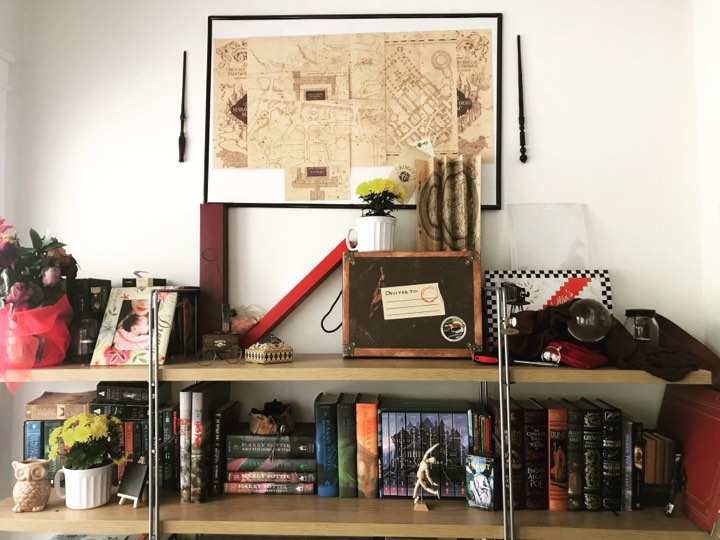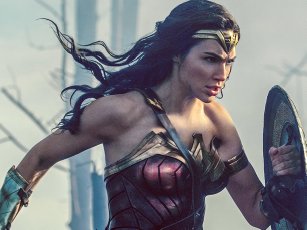This week’s fantasy author of the future is Briari Hallow, dedicated writer, Fantasy reader and animal lover. I’ve invited her to tell you about herself, what she has in mind for you, the fantasy reader, and her opinions on the future of fantasy.
_________________________________________________________________________________—
Briari Hallow (pen-name) is an aspiring writer living in Chicago with her significant other and their two cats and four ferrets (lovingly nicknamed Shanks Nation) four blocks from Wrigley Field. She began writing almost as soon as she could read, mostly stories of fancy regarding kitten rock stars and the adventures of her plush animals. It wasn’t until she was in the seventh grade and became involved in online roleplaying forums that she discovered just how passionate she was about improving her writing craft, and it was then that she began the first drafts of her never-ending novel. She quickly picked up Fantasy as her primary genre, although she dabbles in magical realism, literary fiction, and poetry (when the mood strikes her). Her day job is as a receptionist for a veterinary clinic where she is able to pursue her other passion, the care of non-magical creatures.

Tell us about your work-in-progress.
When I was twelve or thirteen, I began roleplaying online and with my two closest girlfriends. It was amazing, to me, to be able to create these fantastic stories with others, not having any idea of where they were going or what who would say next. It was in these roleplays, which were centered around magically gifted teenagers, that I first created my male main character due to a shortage of male characters on the forums, and soon after I also discovered my female MC.
Eventually, I knew they came from the same world, one very different from the ones I was using them in on the forums. I could picture them sitting beneath a great tree together, eating some sort of overly ripe, bright magenta fruit the size of their hands. So I started writing their story.
The original opening scenes went nowhere for many years, but I always knew that these two characters were dearest friends in a world that I had not yet finished creating. It’s been about fourteen or so years, I think, that I’ve worked in this world and these characters, and it was only in 2014 that I finally finished a full draft of the first installation.
The series, The Divine Catalysts, is a YA High Fantasy series about a world that was broken when it was still new. Many years after its greatest tragedy, two youths become engulfed in an adventure deemed worthy by their Gods, and they begin a quest to fix what was broken many years ago.
I hope to pursue traditional publication for the series, although in recent years I’ve been mulling over the idea of self-publication. I’ve queried in two large rounds, revised many times, and have tried to build up my social media presence on briarihallow.com and through my handles @briarihallow on Twitter and Instagram. After this revision, which I hope is my final one, I plan on moving on to the second installation and do a final round of querying. After, if traditional doesn’t pan out, I likely will more seriously look into self-publication.

Why do you like Fantasy as a genre?
As many of us can do for many of our quirks, I blame my parents for my liking Fantasy. At a very young age, my parents introduced me to fantasy. I became attached particularly to fairies, I think because my grandmother spent a lot of time in the garden and she herself believed in evil leprechauns and other such fairy tales from living in the Philippines, where magical realism was still very much a part of her everyday life.
My tastes have always remained there – I dabble in horror, or modern non-fiction, and have thought of doing some Victorian Era pieces, but at the end of the day stories of children overcoming great evils have always deeply resonated with me. So, too, do the ideas of dragons, or mermaids, or magic.
Who do you see as your writing influences?
It’s almost a cliché to say at this point, but J.K. Rowling and J.R.R. Tolkien are some of my biggest influences. Rowling’s stories, especially, have helped me through some of the hardest parts of my life—in fact, I fully give credit to her books saving my life and helping me get out of the psychiatric ward a few years ago. I’ve always imagined that I would like to give readers some of what she gave me—strength and courage to face my emotions. Tolkien’s work is timeless, and I’ll always love the idea of hosting dwarves for dinner and grand quests with little hiccups in them.
But, additionally, among my favourite works are by Garth Nix, D.J. MacHale, Phillip Pullman, David-Clemente Davies, and Ernest Hemingway. All of their works influence my writing style – from Nix’s subtle horror themes, to Hemingway’s long, flowing sentences. Having also grown up a huge anime and manga fan, I feel wrong to not mention Hiyao Miyazaki’s work with Studio Ghibli, and Ken Akamatsu’s works, particularly Negima.

What is the future of fantasy? Do readers still want the same old thing or are they looking for something fresh and “different”? Are there things about the genre you find worn-out or over-done? Is there a particular direction you’d like to see fantasy take as a genre?
I see these questions a lot on forums and in writing groups – what tropes are overdone, where is Fantasy, and the such.
The future of fantasy lies somewhere between bringing the things we love about the past and creating more idealized worlds like the one many of us would want to see.
I think most true fantasy fans will never tire of dragons, or elves, or dwarves, or elemental magic and so on. I don’t believe you can overdo a thing. You can do it badly. You can do it without making it your own. But you can’t overdo it.
However, that isn’t to say that we want the same exact things – we don’t want to see Tolkien’s world over and over. We want new worlds to explore and we want to meet new creatures and magics, even if they’re similar to others.
And, just as the people consuming these stories are vastly diverse, so should Fantasy become. Fantasy is still largely dominated by white characters, European settings, and sexist societies. Which isn’t inherently bad, as much high-fantasy is rooted in medieval Europe—but there comes a point in all forms of art where we need to start changing it to match the world we are in and the world we want to see. Especially for me who is a person of color, I want to see more positive diversity in our fantasy novels. This includes diversity in setting – the medieval Europe thing is fantastic, but I know a writer who is doing prehistoric fantasy with dinosaurs that looks amazing, and my version of “elves” live in a tropical, tribal village. There are many ways we can expand the fantasy genre so it continues to grow, and I think that’s very important.
I see a lot of discussions getting caught up in using the excuse of their own background to limit them – white writers not feeling comfortable writing POC, and POC not wanting to have white characters take major roles. But if, as many fantasy writers do, the worlds we are creating are not of our Earth, this is a moot point. Our skin color doesn’t influence who we are as people if we take away our society. In another society, skin color may not have mattered. In another society, women may never have been thought to be the weaker sex. And the brilliant thing is that we can make these changes to our made-up worlds without even needing to excuse this.
There are times and places where these themes have and do contribute to the plot and world of a story, but sometimes they aren’t needed as much. We don’t need a million more red-headed MCs, we don’t need another cover with a cloaked figure in the woods and a raven on a tree. We can create new types of worlds for our favorite magics, and I think it’s really important to see more diversity, even if it’s not in our own works but just by supporting those who are changing the mould of the fantasy genre.

What have been your struggles as a writer? What have been your personal triumphs?
I’m sure mine are the same as many writers, I don’t believe I’ve struggled with “writer’s block” so much as “near-crippling self-doubt.” But I think they are in some ways the same thing.
I get down on myself a lot if I’m not physically sitting at my computer with my document open, editing and revising, but I always try to remind myself that just because I’m not revising my book physically doesn’t mean I’m not thinking about it—which I often am. Anytime I’m quiet and thinking on my own, while driving or while waiting for someone, I usually am mulling over a detail of my world or a character, or what needs to be changed or improved.
I think the time I’ve spent on this first book has also gotten me down—over a decade, after all! But on the other hand, I’m very well-versed on the world I’ve created. I know a lot of history and lore and idiosyncrasies of the world that may not be relevant directly to my story, but are very relevant to the accuracy of the story to itself.
Going off of my earlier point, I struggled a lot because I had whitewashed my own characters. All of my characters were white. And I am not. My upbringing itself was very diverse—we never really made a big deal, expect perhaps a well-mannered joke, about the fact that I’m Asian and Hispanic. We never made a big deal about black cousins, or someone marrying a white person. But I struggled to realize that I had subconsciously made the decision to make all of my character white, because that’s what I was seeing when I was reading my favorite genre.
It took some time, but I changed up my main characters and the world they live in. And I love it the more for that change, because now when I imagine my world, it’s a world I would be happier to live in, where skin color, sex and sexual orientation aren’t issues. And this doesn’t take away from the world or make it less real. This is just a different world than the one we live in.

Why is fantasy an important genre?
Fantasy as a genre allows us to experience magic in real ways, and humans have always been drawn to magic. You can’t tell, for instance, a Harry Potter fan that they don’t know what it feels like when Harry casts expelliarmus and defeats Voldemort. You can’t convince a His Dark Materials fan that they don’t know precisely how to get into the right mindset to read the alethiometer, or what it felt like when Lyra had to cross the river into Death and could feel her soul being stretched as she left her daemon, Pan, at its banks. You can’t tell me that I don’t know exactly what the biscuits and honey taste like in Bjorn’s house on the way to the Lonely Mountain.
Fantasy is an all-encompassing experience. People are so amped about VR experiences in modern day, and there are hundreds upon hundreds of us who already know what it feels like to experience another world, another person, things they can never experience in this life—because for many of us we can read or write these experiences, and feel them truly.
Briari Hollow
Thanks, Briari Hallow. Next week in Tomorrow’s Authors, Alex LeBlanc.



























